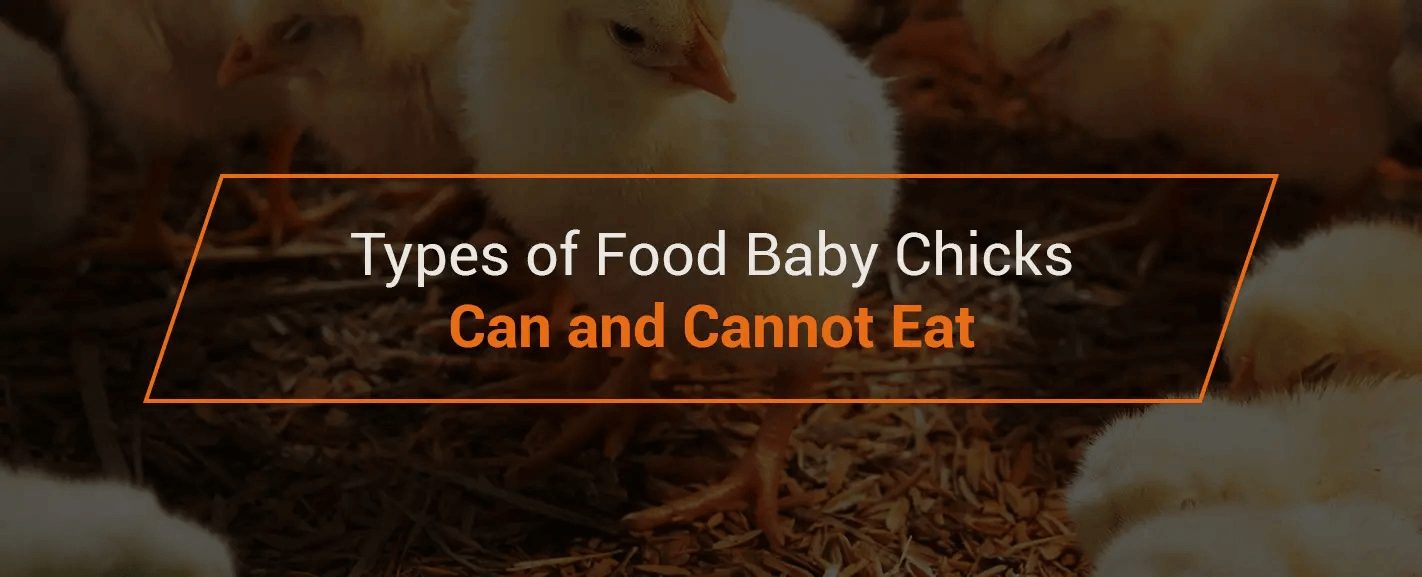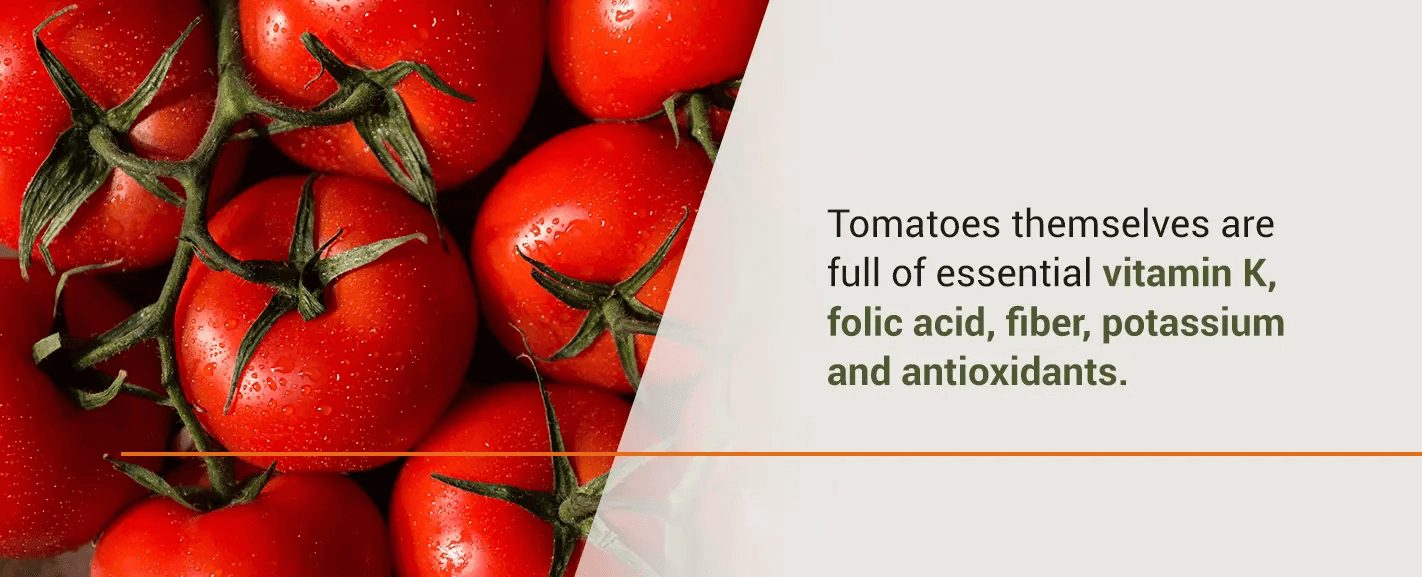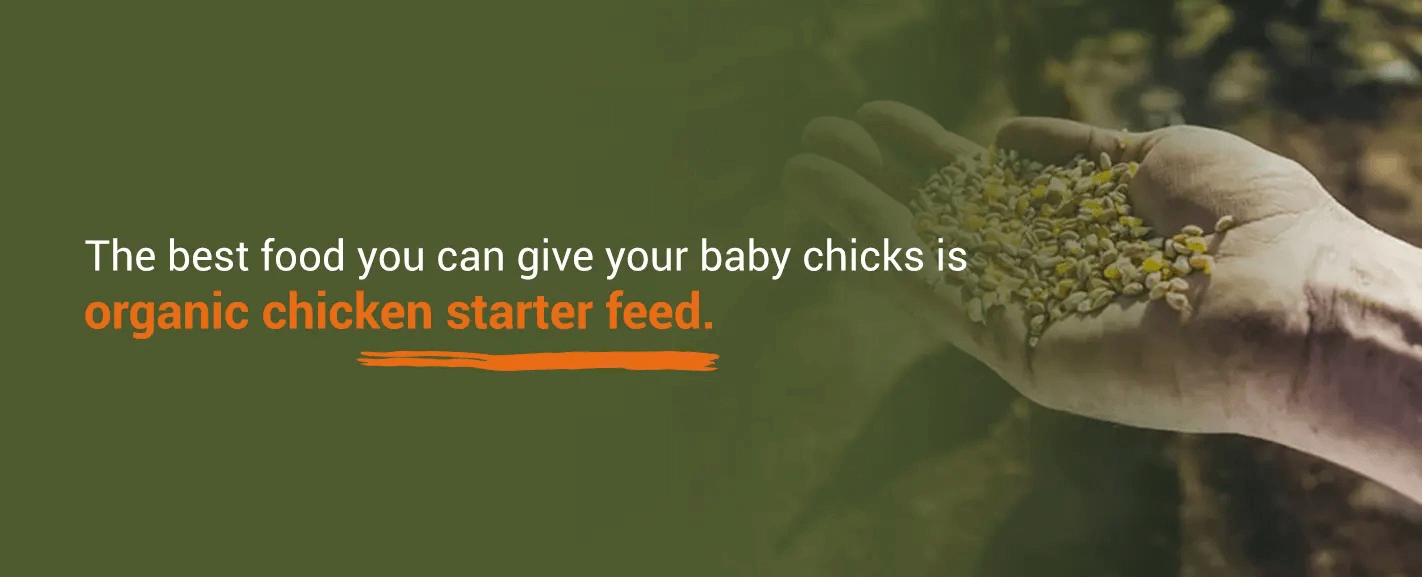How Warm Do You Have to Keep Baby Chicks

Types of Food Baby Chicks Can and Cannot Eat
Chickens are great companions. They provide fresh eggs, nutrients for your lawn and years of entertainment with their big personalities. All-time of all, chickens are like shooting fish in a barrel to feed, willing to finish almost whatsoever of your daily leftovers.
A infant chicks' diet is extremely versatile, but there are some foods to rethink earlier throwing them into the coop. Here, we'll outline the nutrient-dense foods baby chicks dear and the leftovers to proceed in your compost pile.
What Are the Essential Nutrients for Chickens?
Baby chicks require a more nutrient-dense diet than their adult counterparts. When feeding your baby chicks, ensure their feed has the following nutrients:
- Protein:After hatching, a chick's diet should include approximately 18% to 20% protein. Poly peptide builds chicks' muscles, promoting force and bone integrity during their crucial developmental stages. Equally chicks reach 19 weeks old, gradually taper their protein intake to nigh 16% of their diet.
- Vitamins:All poultry crave fat- and water-soluble vitamins. Specifically, they require all vitamins except vitamin C, including vitamin A, D, E and K, niacin, folic acid, biotin, thiamine and riboflavin.
- Minerals:Minerals are equally of import. Baby chicks require a diet with calcium, phosphorus, magnesium, atomic number 26 and copper, among others.
- Grains:Most craven feeds incorporate healthy grains, like corn, wheat and soybean meal. These grains human activity as sources of vitamins, oil and poly peptide, which all poultry require for energy.
- Fats:Well-nigh of a chicken's fat content comes from oils that contain linoleic acid, an of import fatty acid. Fatty acids pause downward vitamins and minerals, allowing chickens to receive all of their benefits.
Babe chicks' feed should provide at least 90% of their nutrition, with the remaining 10% from their pasture.
On top of their feed, poultry require a abiding source of h2o. Chickens drink almost three times their weight in water. A good h2o-to-craven ratio is ane quart per four chickens.
What Can Babe Chickens Consume?
Exercise y'all programme on feeding your babe chicks a homemade diet? Consider incorporating these nutrient-rich foods:
i. Worms
Chickens love worms! Worms naturally exist in a chicken'southward environment, and so it's in their biological makeup to enjoy worms. Specifically, baby chicks tin consume mealworms and scarlet worms. Both are nifty sources of protein, but avoid feeding your chickens besides many worms, or it may overwhelm their system.
2. Crickets
As with worms, baby chicks can consume crickets, and they ofttimes do in their natural environment. Crickets are high in protein, fat and carbs, making them an ideal snack in moderation.
3. Tomatoes
Baby chicks tin can eat tomatoes, but they tin't swallow the plant, leaves or flowers as they contain poisonous solanine. Tomatoes themselves are full of essential vitamin K, folic acid, fiber, potassium and antioxidants. If you accept a garden, toss whatsoever malformed tomatoes into your coop. Your chickens will be thankful!

4. Oatmeal
Oats are considered a superfood, full of vitamins, minerals and some poly peptide. Baby chicks tin eat both raw oats and warm oatmeal every now and and then. Adding birdseed and plain yogurt boosts oatmeal's nutrients, also!
v. Strawberries
Baby chicks can eat fruit, and they especially love strawberries. Strawberries comprise many vitamins and minerals, namely iron, copper, magnesium, Vitamin B and potassium. Also, strawberries are packed with other anti-inflammatory antioxidants that keep your chicks healthy.
6. Bananas
If you have whatever brown, spotty bananas, your baby chicks will gladly eat them for yous! Baby chicks can swallow bananas, but avoid feeding them any unripe bananas. Bananas are high in Vitamin B6 and pyridoxine and a good source of magnesium, copper and salubrious carbs.
seven. Apples
Baby chicks can swallow apples, but you should chop them upwardly and remove any seeds for easier consumption and digestion. Apple tree sauce is some other skillful alternative. Apples are a proficient source of carbs and contain fiber, potassium and Vitamin K, too.
8. Lettuce
When it comes to vegetables, baby chicks can eat lettuce, likewise as kale, turnip greens and chard. Romaine lettuce is high in phosphorous, magnesium, potassium, vitamin K and folate, supplying your baby chick with near all of the necessary minerals. Avert iceberg lettuce, still, as it'south low in nutritional value and may cause diarrhea.
9. Watermelons
Baby chicks tin eat watermelons, but they should never swallow watermelon rinds or seeds. Babe chicks may benefit from watermelon on hot summertime days every bit an added source of hydration. Otherwise, they don't offering many nutrients.
10. Grass
Adult hens typically peck through grass for insects and eat whatever smaller pieces of grass. Usually, 24-hour interval or week-one-time chicks won't show much interest in eating grass. Some owners give their chicks the option, nonetheless, because it encourages foraging.
What Can't Baby Chickens Consume?
Some of your groceries, however, are best left for your compost pile. Foods that babe chickens cannot swallow include:
- Onions
- Chocolate
- Avocados
- Eggplant
- Peanuts
- Moldy Staff of life
- Rhubarb
- Pickles
All of these foods contain different toxins that make baby chicks, and all other poultry, feel sick — or even cause death in farthermost cases. Near chickens instinctively avoid these toxic foods. If your chicks do consume these toxins and you notice illness symptoms, give them plenty of access to electrolytes and extra nutrients. Chickens heal themselves over fourth dimension in less severe cases.
What Is the Best Food for Baby Chicks?

The best food you lot can give your baby chicks is organic chicken starter feed. The foods listed above are healthy for chicks — and you're encouraged to recycle any leftovers — but they may receive also many or as well little nutrients.
Organic craven starter feed is packed with essential nutrients like:
- Organic carbs, including corn, soybean repast and wheat
- Organic soybean oil
- Calcium carbonate
- Zinc sulfate
- Copper sulfate
- Calcium iodate
- Vitamin D3
- Vitamin E
- Vitamin A
- Vitamin B12
- Riboflavin
- Folic acid
Opting for organic chicken starter feed over non-organic alternatives ensures your baby chicks receive non-medicated and non-GMO nutrients. Natural feeds contain picayune to no cheap filler products, giving you more than nutrients for your money and your chickens a healthier lifestyle.
How Much Should You Feed Baby Chicks?
Chickens are good at eating what they demand. Ensure your chicks have a constant supply of organic chicken starter feed and refill their supply as needed.
Considering baby chicks and adult chickens crave different amounts of nutrients, it's best to separate them until the chicks are at to the lowest degree 2 months old. Plus, older chickens tend to exist aggressive with smaller chicks, sometimes bullying them away from nutrient. Keep an heart on every chick and brand sure they're all getting an equal share of food.
Store Organic Craven Starter Feed at Nature's Best Organic Feeds
Kreamer Feed believed in organic nutrient well before the grocery bondage. Since 1998, we have been the leading certified organic feed manufacturer — best known for our make, Nature'due south Best Organic Feeds.
If you're looking for the best feed for your baby chicks, choose our loftier-protein organic chick starter. Our craven feed is packed with essential nutrients, perfect for your growing backyard animals.
Acquire more most our organic chicken starter feed online. You tin can find our products at your nearest Tractor Supply Co., which you can locate straight on our product folio!
Source: https://organicfeeds.com/types-of-food-baby-chicks-can-and-cannot-eat/
0 Response to "How Warm Do You Have to Keep Baby Chicks"
Post a Comment